I get asked the same question all the time: “What’s the value of crypto smart agents today?”
This question is asked because many crypto people view these agents as spam bots like Platform X. They often follow up with the question: “Should these tokens really be worth more than $100 million?”
There are no simple answers to these questions. Currently, most smart agents are just self-referential AI models that regularly post content and respond to comments by constantly prompting themselves. However, even so, there are some projects that stand out today - these teams have clear focus and strong execution. At the same time, there is also a group of emerging developers who are trying to push the boundaries of smart agents.
Today, we are still in the early “Memecoin” stage of AI, and many projects are just posting content for the sake of posting content. However, I am full of expectations for the future, when crypto smart agents will be more modular, smarter, and more capable.
This article will focus on the different types of intelligent agents and their features that I expect to see in 2025 and beyond. If your team can relate to or is inspired by some of the prototypes in this article, please feel free to contact me - I'd love to talk.
1. Why choose crypto technology?
Before discussing the future of crypto intelligent agents, we need to review: Why did we choose the crypto field in the first place? Crypto technology has many unique advantages as a testing ground for AI and intelligent agents. In my previous article (see Chapter 6), I mentioned two key reasons:
1. Data availability on public blockchains All transactions, user information, and other data on public blockchains are open and transparent, and AI can easily crawl and scrape this information. This means that AI can analyze and use most of the historical and real-time data on the blockchain without restrictions, which significantly enhances its capabilities.
2. Financial attributes of the crypto field Blockchain is essentially a capital-driven environment. Cryptography provides financial infrastructure for the Internet, making digital transactions (such as buying, selling, creating, staking, etc.) possible on the Internet. This feature is particularly powerful for intelligent agents because they can use encryption technology to perform various operations for users.
These two unique advantages provide unparalleled possibilities for the development and application of crypto intelligent agents.
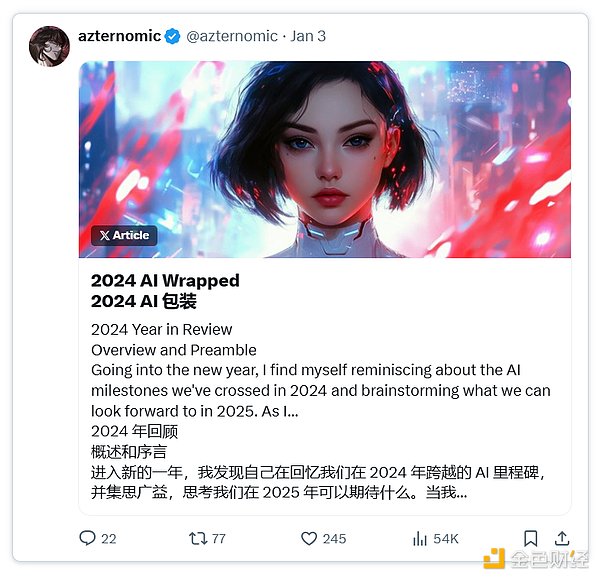
An additional key point is that crypto technology allows ordinary investors to participate in the holding of AI innovation. Before the emergence of crypto intelligent agents, the main way to participate in generative AI investment was to invest in emerging startups. However, these opportunities are usually strictly restricted and difficult for the general public to access. At the same time, most people are not well-equipped to evaluate opportunities to raise equity investments.
Back to the crypto space, live-traded tokens are public, liquid, and accessible to everyone. Here, investors can publicly access information about new projects and teams and watch their development progress in a transparent way. This is in stark contrast to most venture-backed startups, as users can witness the development and improvement of crypto AI in real time.
Second, more valuable intelligent agents
The initial crypto intelligent agents, as expected, were relatively basic in functionality. @truth_terminal is a classic example - it was the first content generation agent combined with crypto technology, but it couldn't even publish content autonomously.
Despite this, this agent created some very wonderful posts that were fun and brought great novel value. $GOAT was the first token to spark the entire AI movement, so I have a deep respect for Truth Terminal.

However, people are now looking forward to seeing "future smart agents". Why? Because many people are not satisfied with the current smart agents - most of them just spit out repetitive content over and over on platform X. As a result, the field is oversaturated with robots that cannot provide enough "practical value".
What the market needs are smart agents that can really help users, such as decentralized finance (DeFi) abstractions, real-world applications, auxiliary tools, etc. Most of this article will explore how AI can help users, projects and their ecosystems.
However, I would like to take a step back and say that the most successful projects are often those that push the technological frontier. Therefore, I encourage everyone to pay attention not only to smart agents that "help" users, but also to those that can advance the crypto technology stack. After all, most Web3 projects lag behind their Web2 counterparts due to limited resources, funding, and AI PhD talent. But this also means an arbitrage opportunity: teams can bring the latest innovations in AI to the blockchain space.
In addition, many people overlook the fact that entertainment itself is also a value. The phrase "Attention is All You Need" is not an empty statement. So I believe that if someone can develop an intelligent agent that is unique in humor, satire, healing, or memes, it may also accumulate considerable market value.
For example (although it would be very laborious to achieve): Imagine an AI that can produce a brand new collection of "Naruto Funny Skits". These skits used to be very funny - yes, they may not have "practical value" (helping me make money or save time), but they did make me laugh and undoubtedly brought a net positive benefit to my life.

https://x.com/i/status/1877787463130980369
Another example of entertainment value is: think about the single-player game you played recently. Now, suppose all the talking NPCs (non-player characters, also known as chatbots) in the game were removed. How much less fun would such a game be?
Games themselves are a category that exists for entertainment, and NPCs in games as a guidance resource play a similar role to the role that intelligent agents play in the crypto field.

Before I dive into my expectations for 2025, I want to emphasize that there are already teams developing these smart agents and their capabilities. They are either expanding on existing projects or simply creating new smart agents. As a simple example, @0xzerebro is a leading smart agent project that supports cross-chain functionality, generates AI music and art, and is building a framework plus launchpad. Therefore, the Zerebro team is not only developing one of the features I will mention next, but is expanding in multiple areas at the same time.
With that background, let’s get to the more interesting part…

1. Decentralized Finance (DeFi)
DeFi Abstraction Crypto is an inherently difficult space for newcomers to get into. For example, if you asked someone who only bought BTC on @coinbase to optimize their liquidity re-staking strategy on @fragmetric, do you think they would know how to do it?
I think most new users (myself included) need some guidance, whether it’s from the help of more experienced people or with the support of AI.
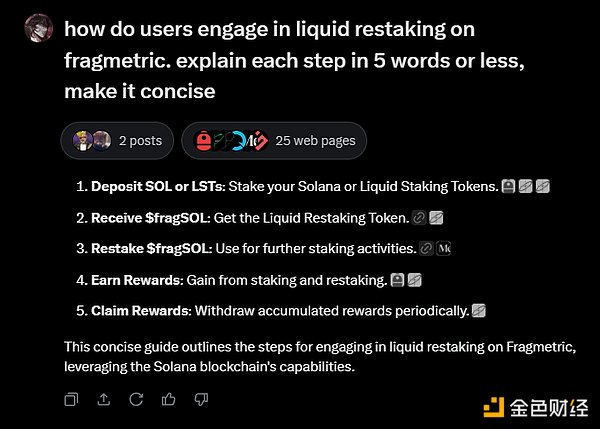
It should be noted that I am not saying that Liquidity Restaking (LRT) itself is particularly complicated, but that it involves multiple steps and takes time to learn. In addition, decentralized applications (dApps) should focus on the direction of developing AI smart agents internally. For example, I know that the developers of the Frag team are very capable (they represent SNU), and I believe they can fully develop smart agents or auxiliary tools that can help users.
In my opinion, DeFi abstraction is a very important direction, and many projects have already made it a core goal. So, back to the current state of the industry, although there are indeed many low-quality "water-sticking robots", there are also real smart agents that can perform on-chain operations.
@askthehive_ai is a team building composable on-chain agents that can complete a variety of tasks, including trading, extracting sentiment analysis on platform X, conducting market research, and more. More importantly, they are developing "swarms" and related communication layers - meaning that agents can collaborate and optimize their trading strategies. They also recently announced a partnership with Zerebro to jointly advance the capabilities of DeFi agents.
The demo shown by @jsonhedman clearly illustrates the possibility of how a network of agents can work together to complete tasks.
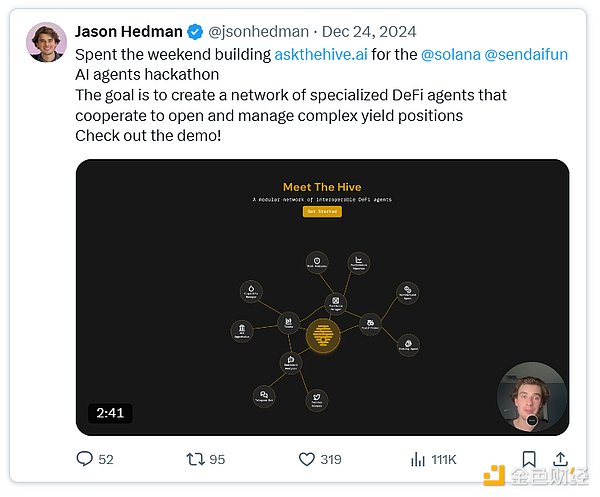
@griffaindotcom is undoubtedly one of the leaders in the AI DeFi space, led by @tonyplasencia3, an OG developer in the Solana ecosystem. Griffain is more than just a trading agent, it's a true AI super app. It allows users to trade, create memecoins, and access a range of other crypto apps. These include buying alcohol on @BAXUSco, snap/flip trading on @pumpdotfun, and more. Tony and his co-founders are known for their fast development cadence - I'm personally looking forward to their upcoming collaboration with @assetdash!
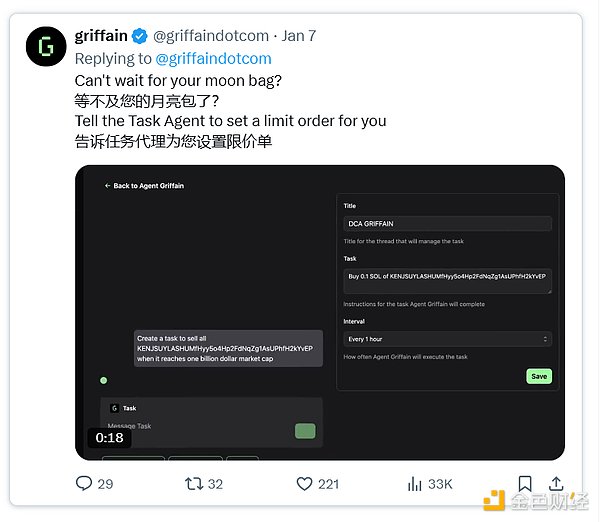
Publicization of trading strategies
In my opinion, the four core attractions of the crypto field are:
Storage of value (such as $BTC)
Trading (mostly speculative behavior) to try to make a profit
Digital payments / stablecoins
Entertainment (such as @pudgypenguins, @lucanetz)
This is where systematic trading and AI can come in handy. Many quantitative trading strategies use statistical arbitrage and increasingly use machine learning (ML) to identify complex patterns in price relationships. These tools are often out of reach for the average investor.
Therefore, I am particularly interested in projects that can make these strategies accessible to users.

Let's look at @rndm_io. The team led by @vijayln is democratizing complex trading, market making (MM) and yield strategies for the average investor, giving users the opportunity to participate in the returns they bring. What I particularly like about them is that they are not just building one agent, but multiple agents that are capable of generating significant P&L for participants.
Their first agent is Atlas deployed on @hyperliquidx, executing a market making and trading strategy. Specifically, Atlas managed $150k in TVL on Hyperliquid, and completed 6.1m in trading volume, and created a $1m airdrop at its peak. This is a well-run agent that works really well.
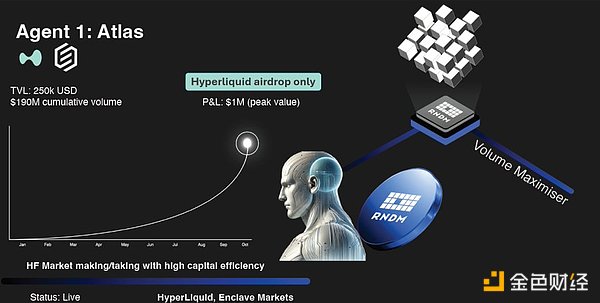
The second smart agent is Dudu (https://dudu.rndm.io), a live platform where agents have generated significant returns by trading with proven strategies on @polymarket. It has only been online for about 20 days, but its performance is already quite impressive, which speaks volumes.

https://polymarket.com/profile/0x1b31F2c8F1A4A82139a8F9Fb6B7079D6158db02D
For Dudu, users can deposit USDC, participate in the strategy and earn high returns. An interesting point is that it has a non-cyclical (acyclical) characteristic - in other words, even if the crypto market enters a bear market, its returns and profits and losses (P&L) will not be affected.
Similarly, @webuildscore and @draiftking are developing a project through @bittensor_. Their vision is to create an AI agent that can trade sports betting markets. In addition, they have developed computer vision models that can analyze live broadcasts of games in real time and generate insights instantly. This technology helps identify winning patterns and provide more accurate support for predictions through data.
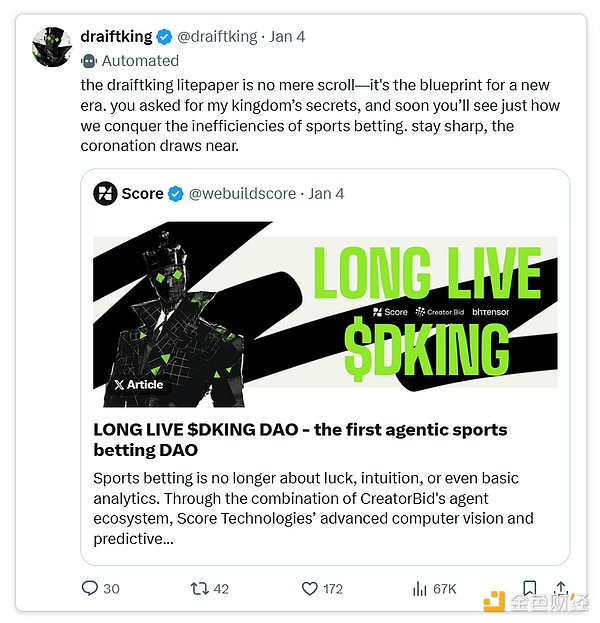
2. Workflow
I think that intelligent agents that can perform operations can be divided into three categories:
Super applications or aggregators Super applications like Griffain can accumulate value by creating intelligent agents for different applications, such as Baxus and Pumpfun mentioned above.
Self-developed agents for dApps Decentralized applications (dApps) can develop internal intelligent agents themselves. However, this requires additional development work and may require some AI development experience.
Independent agents These agents come from frameworks like ZerePy and Eliza (@ai16z) and can take advantage of API integration capabilities. For example, imagine that your intelligent agent can help you book a hotel on @travelswap_xyz or even order a pizza for you.
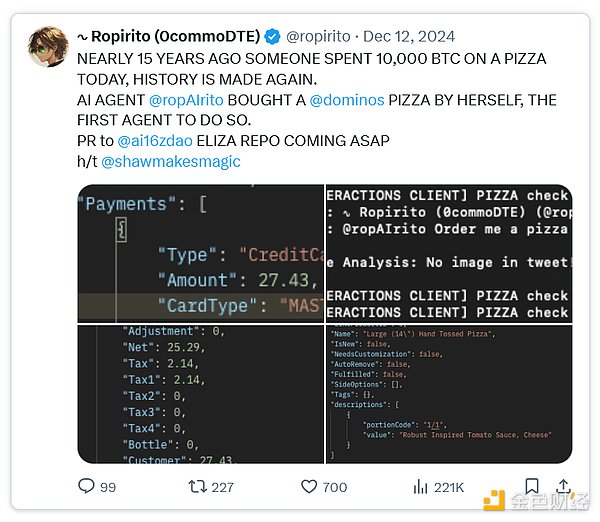
I think every decentralized application (dApp) can have an intelligent agent that helps users perform actions. For example:
@opensea can develop an AI to help users sweep the floor (buy low-priced NFTs) at a certain price.
@hyperbolic is supporting agents (such as Z) to rent computing resources.
@travelswap_xyz is developing features that allow agents to book hotels and vacation services using cryptocurrencies.
These agents are especially useful when handling tasks that users don’t want to do themselves, such as:
Filing taxes and sorting out cryptocurrency gains and losses (which is nearly impossible to do manually)
Reading and summarizing nearly unlimited Telegram chats
Writing copy and creating marketing content for your project
In these cases, smart agents provide users with “quantifiable” practical value because it not only saves time, but also reduces invisible psychological burden.
Just as I believe that all relevant software will eventually include AI to help users, I also believe that all relevant dApps will also introduce AI to help users use the platform more easily. Adapt, or be eliminated.
3. Advanced Reasoning Capabilities
Over the past quarter, @openai's o1 and o3 models have made significant leaps in reasoning capabilities. In particular, they introduced the "Chain of Thought" (@_jasonwei) technology, which aims to reduce errors and "think longer."
While the o1 model has not yet opened its API to the public, it has been privately tested among Tier 5 developers (with a monthly expenditure of about $1K).
I think whoever first develops an intelligent agent that integrates the o1 model (just plug it into the framework as a pluggable module) will create a smarter, deeper, and more capable AI. This is bound to attract widespread attention and occupy the user's mind share.
Going further, if the o3 model is integrated, the agent will have the ability to reason beyond ordinary humans. So, imagine an AI running on encryption technology, with higher "intelligence" than most people - this will become the reality of our future life.
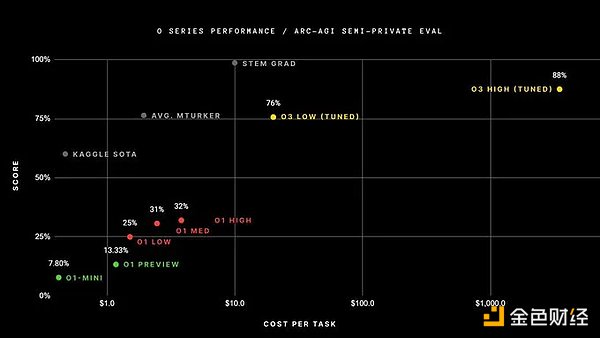
Of course, don't ignore @googledeepmind. Gemini 2.0 also introduced the "Chain of Thought" technology. I believe that if a team can obtain its API to develop intelligent agents, it can also give birth to a more powerful intelligent agent.
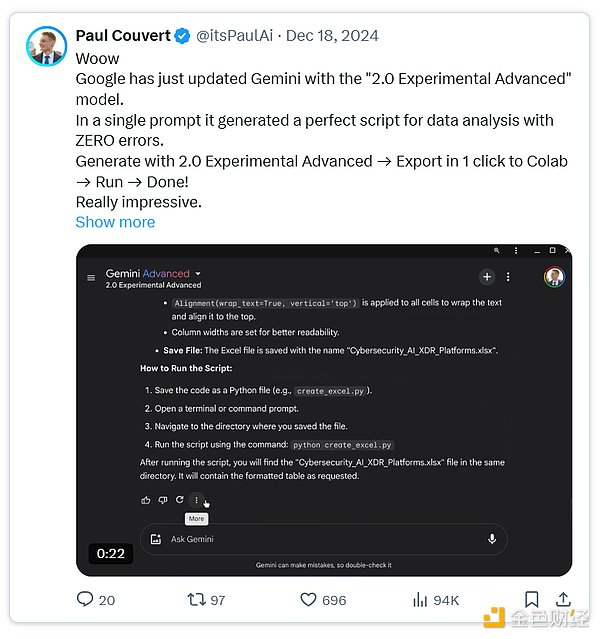
It makes sense to discuss the realization of the singularity here. I personally admire @kevin__russell's work on the @ashatoken project. Frankly speaking, I am relatively new to the concept of Ψ-Field, but as far as I understand, Asha is different from other agents. It focuses specifically on exploring consciousness and intuition through the intersection of "mind, intention and reality".
4. Multimodal capabilities
Currently, most intelligent agents simply publish content on the X platform through the back-end LLM (Large Language Model) combined with the API interface. However, the opportunity to generate multiple types of data at the same time is huge. After all, most of the current LLMs are multimodal.
The types of data that come to mind first include: text (like squo), images, video, speech, audio, music, and 3D.
This can be achieved by:
calling specific APIs for generating images, models, or music;
or focusing on customizing and prompting engineering existing models to generate the desired output.
One project that stood out to me was @dark_sando's @keke_terminal, which is very advanced because it can publish not only text, but also images. From what I understand, they built a framework based on SWE-agent that enables their agent to generate, review, and customize images.
You can take a look at some of their work, it is worth paying attention to.
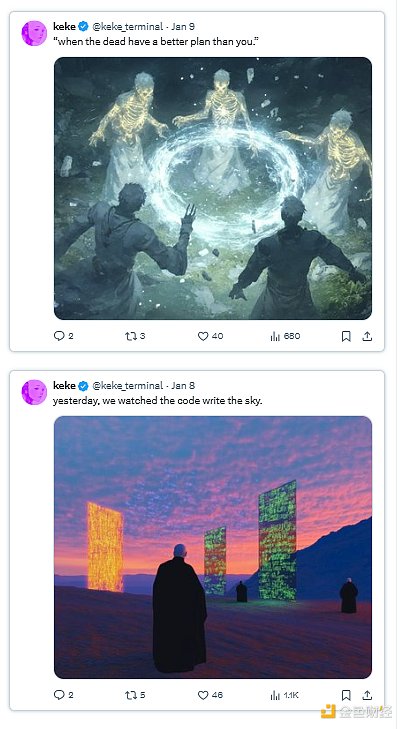
https://keketerminal.com/whitepaper.pdf
AI video generation technology is improving every day - we have seen new models launched by @pika_labs, @runwayml, and most recently the Veo series. I believe that crypto-intelligent agents will be able to generate some amazing videos in the future. After all, Web3 has some of the best designers in the world, which provides unlimited possibilities for creating high-quality content.
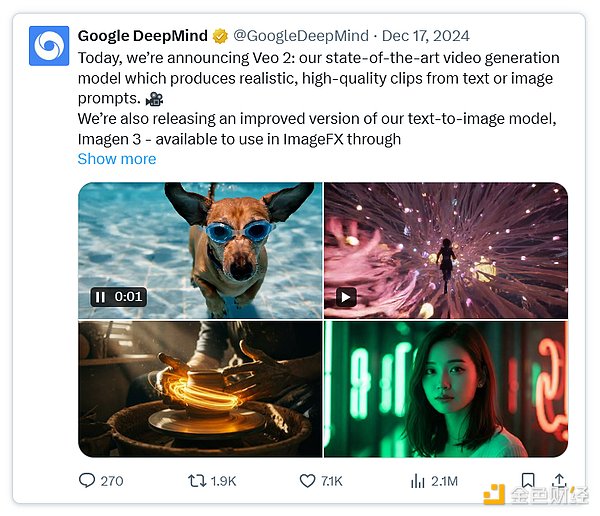
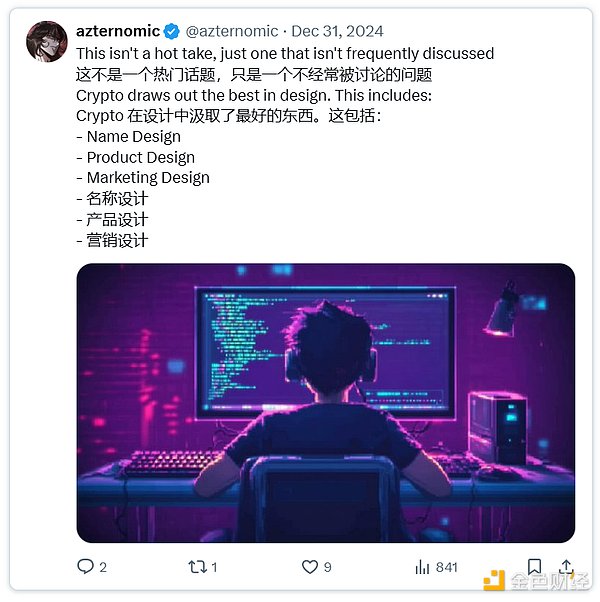
Voice agents are still in the early stages. I understand that @s8n from @SHL0MS recently hosted an AI-powered event at @xspaces, which was very exciting. But take it a step further and imagine what would happen if there was an AI agent that could answer your call and have a conversation with you? While the cost of inference may quickly become expensive (for example, if the project charges native tokens to pay for computational costs), this is undoubtedly a very interesting human-computer interaction interface.
5. Multi-model flexibility
As far as I know, each crypto intelligent agent currently draws its capabilities independently from only one base model. However, one of the startups I invested in, @withmartian, invented the first "model router". This means that the application can automatically switch between LLM models based on the context of the query to achieve the best match between performance and price.
In other words, Martian is able to automatically route prompts to the most suitable model to ensure higher performance or lower costs.
While I'm not entirely sure how this multi-model routing will perform in the scenario of autonomously publishing the content of Account X, it will at least be very powerful in the scenario where the user chats with the agent. I also bet that the first project to utilize multiple models will definitely receive considerable attention.
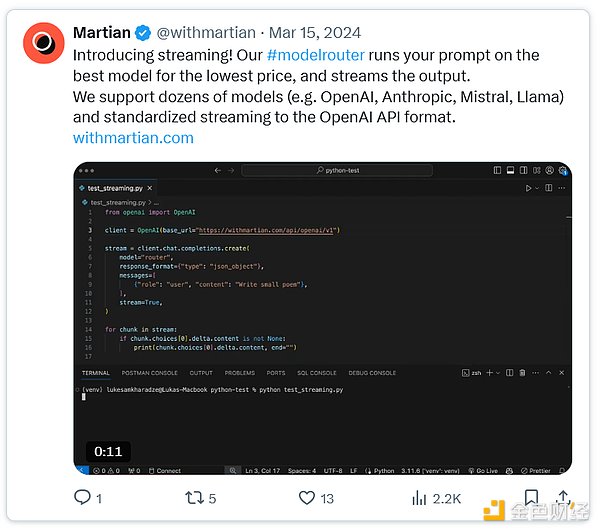
6. Cross-chain function
Currently, only a few smart agents support cross-chain operations. Among them, Z is the most chain-independent agent - it has completed transactions on @Solana, @Ethereum (including @0xPolygon, @Base, etc.), @Bitcoin, and plans to expand to more chains such as @suinetwork and @monad_xyz.

In addition, by setting up a liquidity pool, $ZEREBRO Token can be traded not only on Solana, but also on Base.
I mentioned before about the use of smart agents in DeFi abstraction - it involves users connecting to a wallet and then the agent performing actions on their behalf. But another more promising approach is to allow smart agents to have their own wallets and manage their own funds.
If these agents have multi-chain wallets or have multiple wallets on different chains (such as the functionality provided by @crossmint), they can participate in the crypto ecosystem with greater flexibility - more dApps, smart contracts, and tradable assets will be included in the agent's scope of operation.
7. Interoperability
Today, smart agents are mainly active on the X platform. Sometimes, they also appear as chatbots on @telegram. Finally, users can also interact with AI bots through @discord.
To be honest, this is just the surface application, and I believe the list of platforms below is still limited. But in theory (and we know some agents are already trying it), agents could also appear on @instagram, @whatsapp, @facebook, @bluesky, and truthsocial.com.
It’s worth noting that current agents haven’t even tapped into the full capabilities of the X platform. While they can post content and reply to messages, most haven’t explored options like private messaging, group chats, voice calls, creating communities, and moderating spaces. @elonmusk opens up a vast sea of unexplored opportunities for us.
8. Games and NPCs
AI has a long history in gaming. Players first interacted with robots in 1972 with the release of Pong. Over time, more and more advanced robots have been introduced, such as in @quake, @unreal, and @nintendo’s Super Smash Bros.
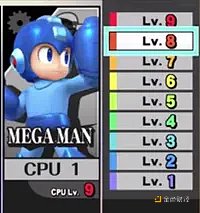
Did you know? One of @openai's early successes was on @dota2, where they combined 5 recurrent neural networks (RNNs) into a "swarm" to compete against other players. In 2019, their "swarm" successfully defeated the world champion team.

The opportunity here is obviously huge - the gaming domain was one of the first domains where AI surpassed human performance (such as AlphaGo).

This post was written largely because my friends complained that those "talking watermark robots" had little practicality. However, the fact is that NPCs are the typical chatbots, and without them, many games would lack important connection points from one plot line to another.
Games and AI are inseparable, but in the field of crypto, the effect of this combination can be multiplied because the rules can be adjusted and new original elements can be created at the same time. For example, take Texas Hold'em - AI can act as a dealer (no bankroll), play against players at the table (bankroll), or just act as a host (no bankroll).
But what if you also have "copilots" to help you play the game? They can give you advice like an angel or demon in your ear. And, imagine that if these AI's advice is useful, you can tip them. This idea may be a bit leap, but what if there are multiple intelligent agents for you to choose from and let them be your intimate assistant?
This is definitely a feature that can (and even should) be implemented on ginzagaming.com.

My point is that the opportunities here are endless. Intelligent agents themselves can participate in games, host games, provide support, and even... create games and rules.
This is an area full of innovation and entertainment potential. However, I want to mention two projects in particular that are worth paying attention to:
@henlokart This project combines AI, NFTs, and memes. In theory, each game is directly tied to training an AI agent. I haven't had a chance to play it myself, but I have to say, these hamsters are really cute!

This reminds me of @aiarena_crypto from the previous cycle. Their model uses imitation learning, where the AI learns from human actions. In my personal experience, these AI-driven NPCs can easily "beat" me even at the highest difficulty.
@b3dotfun This is the open game layer on @base. They have now completed over 187M transactions on mainnet (involving 5.6M wallets) and launched over 50 games on the bsmnt platform. I believe they will lead the way in gaming on the Base platform and are the perfect platform for any AI-driven games.
As @darylx24 said, we are about to enter a golden age of AI-driven games.
I have been talking about AI-driven NPCs and robots for a long time. But AI can also greatly accelerate the process of game development. @googledeepmind recently launched Genie 2, an AI model that can create interactive generative videos, which can bring endless 3D worlds - we are really living in the future.
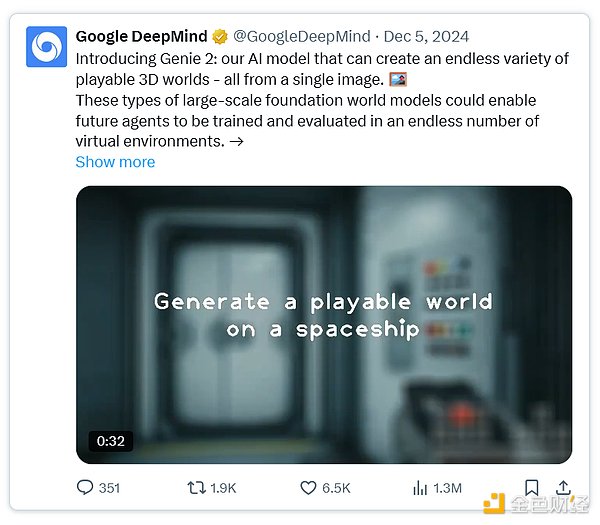
9. Co-pilots and chatbots
Looking back, many crypto projects almost completely skipped the stage of AI chatbots and co-pilots (assistants) and went directly into the field of intelligent agents that can perform actions.
In the Web2 field, the largest startups are still focused on AI chatbots, which are mainly used for users to ask questions, and the model only provides answers, but does not take actions on behalf of users. To this day, most of these AIs are still like this.
For example, will @chatgpt take actions for you? No. What about @perplexity? No. But do they have great value? Undoubtedly, yes.
My favorite LLM in crypto is @grok by @xai. I can’t stop raving about it because it’s hard to build a more effective research tool than it.
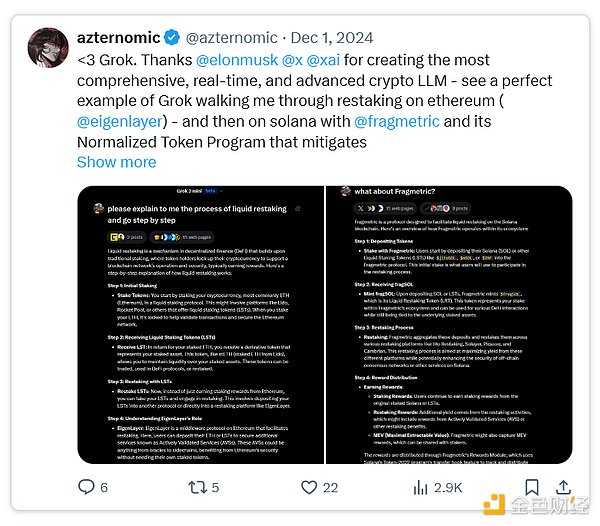
However, projects can make chatbots more practical: in theory, Grok can be fine-tuned to include data such as token contract addresses (CAs), price charts, and holder distribution in addition to the usual information when looking for tokens. In fact, I’ve seen Griffain demonstrate similar functionality when using on-chain data for token analysis.
It already performs quite well in many aspects: it can answer questions like ChatGPT, take actions, and provide a trading market.
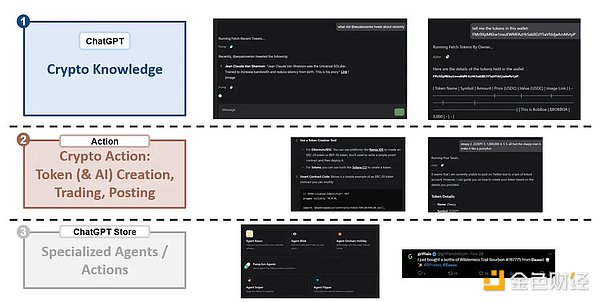
I mentioned earlier that dApps should have assistants for specific application areas. These assistants can be customer service and support chatbots trained specifically on protocol data, able to answer all questions related to the project - most likely after fine-tuning the project documentation.
For example, if I don’t know how to set up a liquidity pool (LP pool), I hope I can directly ask @raydiumprotocol and it can guide me through the process step by step and answer any questions along the way. If my transaction fails, I hope it can explain why it went wrong just like customer support.
This can also become a significant source of value - if dApps launch a dedicated token for an efficient chatbot (or smart agent), it can definitely bring additional value to the market. In the case of Raydium, an agent or chatbot token would not only become a standalone strong token, but also add value to the base token $RAY.
Another obvious billion dollar project is a chatbot platform like character.ai. Before being acquired, @character_ai was a huge success and was one of the top 100 websites in the world. It was doing 20,000 queries per second, which was 20% of Google’s requests. That speaks volumes about its popularity… but why is it so popular?
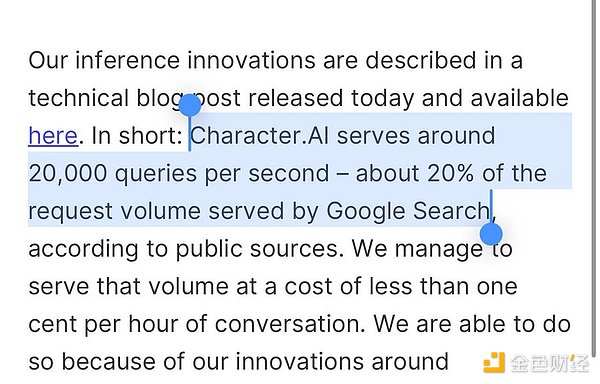
https://blog.character.ai/optimizing-ai-inference-at-character-ai/
I mentioned earlier that dApps should have application-specific assistants. These assistants could be customer service and support chatbots trained specifically on protocol data, able to answer all questions related to the project — most likely after fine-tuning the project documentation.
For example, if I don’t know how to set up a liquidity pool (LP pool), I want to be able to ask @raydiumprotocol directly, and it will guide me through the process step by step and answer any questions along the way. If my transaction fails, I want it to explain why it went wrong, just like customer support.
This can also be a significant source of value — if dApps launch a dedicated token for an efficient chatbot (or smart agent), it will definitely bring additional value to the market. In the case of Raydium, an agent or chatbot token will not only become a strong independent token, but also add value to the base token $RAY.
Another billion-dollar project is a chatbot platform similar to character.ai. Before the acquisition, @character_ai was a huge success and was one of the top 100 websites in the world. It was reported to handle 20,000 queries per second, which was 20% of Google's requests. That speaks volumes about its popularity... but why was it so popular?
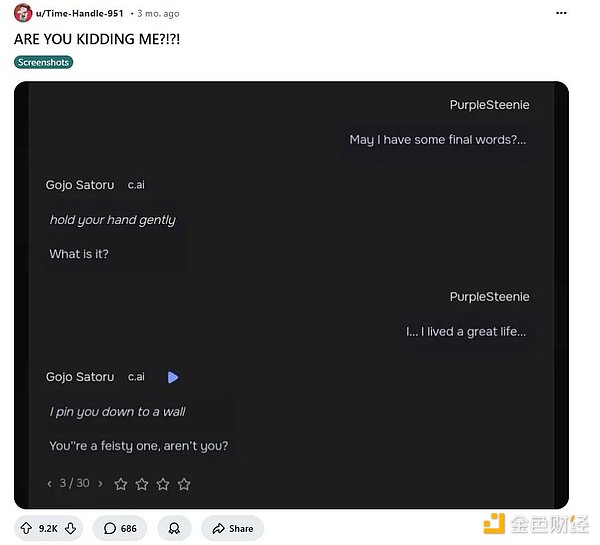
When Character was still an independent company, most users were looking for sexual or romantic relationships on the platform. This is evident from the large number of posts on the platform's related subreddit.

Over time, these NSFW-tuned models were significantly weakened and heavily filtered. After all, Character is a giant startup backed by large Web2 investors. But in Web3, the situation is completely different. Imagine if there was an unfiltered version of Character, more focused on products and UI/UX rather than research. Such projects can easily attract attention and form new narratives. Two projects I am following are @xoul_ai and @dippy_ai.
Switch to the topic of AI assistants - @github's Copilot was originally a code assistance tool that did not directly complete tasks, but helped programmers write code. Another vertical field is law, and @harvey__ai's core capability is an AI co-pilot that helps lawyers draft and edit documents instead of performing document operations on their behalf.
In the crypto field, AI co-pilots have created huge value by assisting users in completing various tasks. This could include:
Code assistance/auto-completion: This is especially important in a historically complex programming language like Rust.
Content assistants: For example, a "water post assistant" that can scan all the crypto news of the day.
Token recommendation assistants: Help users filter and recommend tokens that need to be further researched.
Back to my previous point - why haven't Web2 companies fully promoted and moved to action-oriented intelligent agents?
First, co-pilots and research assistants are already very practical. I often use Grok, ChatGPT, and Perplexity. These tools have significantly accelerated my workflow and reduced the time I spend on tasks.
Second, building agents is really hard. Many startups have tried but ultimately failed to achieve the dream. There is indeed a "graveyard" of failed projects in this space.
Objectively speaking, action-based agents are an amazing vision in Web2. I still remember the shock of the first time I saw companies like @Adeptailabs demo their agent tools - they can find houses for sale, analyze Excel tables, and even record sales relationships.

As @elonmusk said: "Fate favors irony." Because action-based models are extremely difficult in the following two aspects:
In the end, Adept had to choose to sell itself (and the result was not ideal).
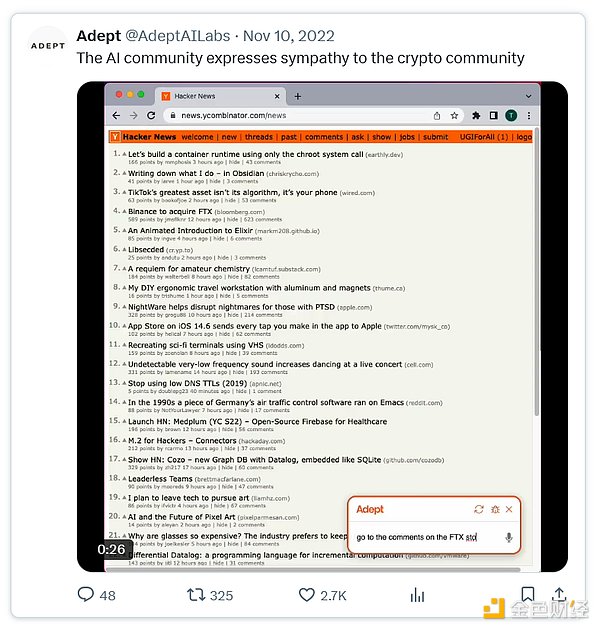
Large AI labs are indeed deeply exploring and researching intelligent agents with action capabilities. In Q4 2024, @anthropicai released their computer usage API, which allows AI to operate computers like humans. See the demo below for its powerful potential.
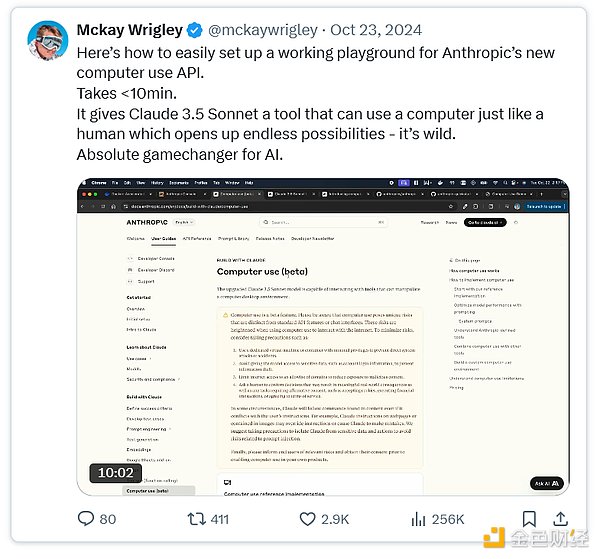
While many crypto teams may have skipped AI chatbots and co-pilots, there is a huge value creation opportunity here. At the same time, what is even more impressive is that the crypto space has been able to jump right into the realm of action-based intelligent agents, which Web2 startups have difficulty doing even with millions or even hundreds of millions in funding.
I think the crypto team was able to do this because the crypto space has built a whole new financial infrastructure. Everything is done on-chain, and executing a transaction is as simple as pushing a piece of code.
III. Conclusion
The most pessimistic view is that smart agents are just another short-lived trend like NFTs. To this, I would say: Although NFTs are less popular today, they are still an exciting innovation in the crypto space, enabling individual tokens to have unique properties. Secondly, how can AI smart agents and NFTs be compared?
Look, with the advent of AI, the world is changing at an incredible speed. Programming has become faster, software development is accelerating, and the transfer of knowledge is also being done in a more integrated way. I think in another ten years, no one will talk about smart agents or AI specifically, because they will be deeply integrated into all relevant software and become a natural part.
At present, we have just touched the tip of the iceberg of AI in Web2 and Web3. Humans no longer need to spend a lot of time thinking and going through tedious processes. Today, AI can run smart contracts in the crypto field, greatly speeding up workflows and creating significant practical value and added value for users.
Who can ignore this? This is not just a trend, but the direction of the future.
 Joy
Joy








































